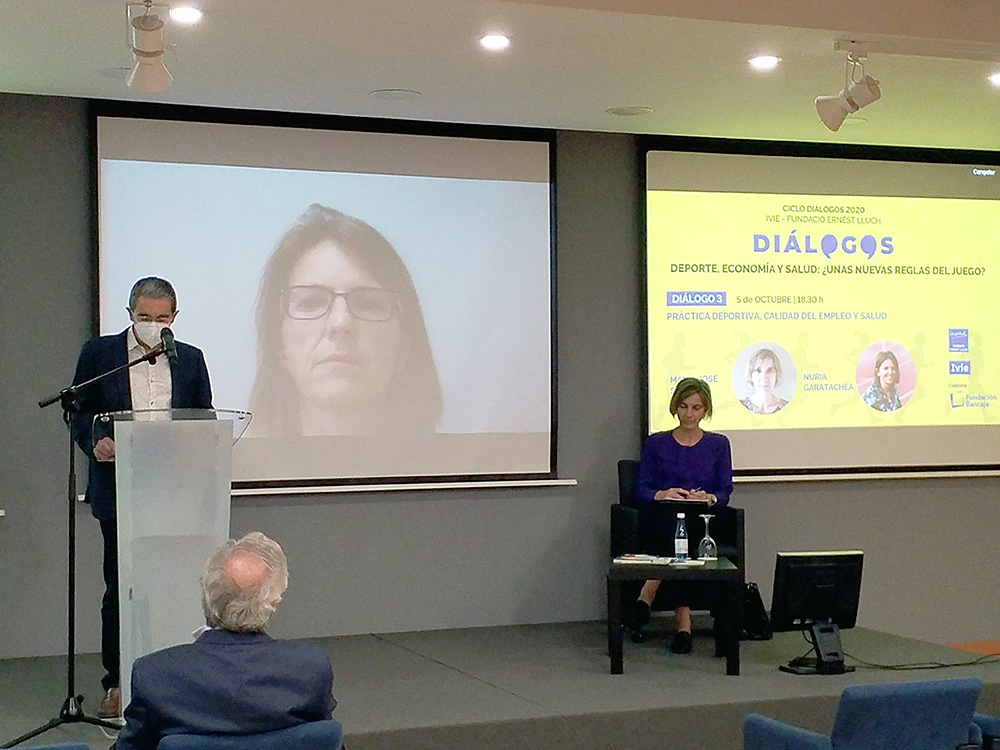Esta web utiliza cookies para que podamos ofrecerte la mejor experiencia de usuario posible. La información de las cookies se almacena en tu navegador y realiza funciones tales como reconocerte cuando vuelves a nuestra web o ayudar a nuestro equipo a comprender qué secciones de la web encuentras más interesantes y útiles.
News

Nuria Garatachea: Physical inactivity is the real pandemic of the 21st century and politicians are not taking it seriously
Experts warn that 30% of the Spanish population do not carry out the minimum weekly exercise recommended by the WHO
The World Health Organization (WHO) recommends that adults should do at least 150 minutes of moderate-intensity physical activity throughout the week, or 75 minutes of vigorous-intensity activity. However, 30% of the Spanish population do not carry out these weekly minimum exercise recommendations, as explained by Nuria Garatachea, Professor at the University of Zaragoza and former Higher Sports Council (CSD) Deputy Director General of Women and Sports, and María José Suárez, Professor at the University of Oviedo, in the third dialogue of the series “Sports, Economy and Health: Changing the Rules of the Game”, organized by the Ernest Lluch Foundation and the Ivie, in collaboration with the Bancaja Foundation.
The two speakers also warned of the gender gap that exists in this regard, since on average 23% of men worldwide do not practice any physical exercise, while this percentage reaches 32% for women. As for children, they highlighted the importance of practicing sports especially between the ages of 5 and 17, for whom the WHO recommends at least 60 minutes a day of moderate to vigorous physical activity.
During the dialogue, Nuria Garatachea insisted that the real pandemic people are suffering in the 21st century is physical inactivity and sedentary behavior, against which almost nothing is being done. She emphasized that “it is urgent for politicians to take action, at both national and international level, in promoting the practice of sports, even more so when its health benefits are recognized worldwide”. In fact, one of the nine target measures implemented by the WHO to treat noncommunicable diseases includes physical activity.
Along with the personal health benefits obtained by those who practice sports, both speakers analyzed other positive effects. María José Suárez highlighted that workers who carry out physical exercise on a regular basis have fewer sick leaves and develop skills that are highly valued by employers, such as teamwork, discipline, ability to manage stress, etc., and therefore have better job opportunities. In addition, she mentioned that, according to recent studies, people who regularly practice sports have a 5% higher income level in comparison to those who abstain.
Moreover, the practice of sports by the population also has an impact on the public health system in reducing costs, since “70% of the costs related to physical inactivity (medical appointments, hospitalizations, premature deaths,…) fall on the public sector”. However, she denounces that “public spending on sport related activities is one of the first to experience cutbacks during a crisis.”
According to both Professors, neither the political class, nor businesses nor society as a whole are taking action to reverse the sedentary behavior of the population. Nuria Garatachea recalled the initiative “Receta deportiva ya” which was created with the purpose of incorporating physical activity on medical prescription, but “medical students are not learning how to encourage exercise or how to prescribe it as a therapeutic measure.”
In general, physical exercise is not promoted at the workplace in Spain as in other European countries. For example, the purchase of bicycles to travel to and from work is subsidized in France. While in Spain, according to the data offered, out of the 65% of workers who say they practice sports, only 2.5% do so in the workplace. Nuria Garatachea highlighted that this small percentage of people are more productive because they suffer fewer sick leaves. She also encouraged the creation of tax incentives for firms that promote physical activity within the workplace or while traveling to and from it.
Physical exercise to fight against COVID-19
Regarding the COVID-19 pandemic, Nuria Garatachea referred to a forthcoming study from Finland, with participation by a Spanish researcher, David Jiménez Pavón, on the effects of physical activity on our immune system and on the risk of suffering an infectious disease such as COVID-19. According to the study, people who practice sports decrease the risk of acquired infectious disease by 31%. Furthermore, physical activity not only decreases mortality from infectious disease by 33%, but also improves the immune system and strengthens the effects of vaccines. “These results support the fact that strict confinement measures can be harmful to people’s health, while any regular physical activity will help boost people’s immune response capacity”, she added.


